Advantages of Custom Software Development


.avif)
Subscribe to our Newsletter
Custom software development is a powerful way to create tools that match your exact goals. Instead of working around off-the-shelf constraints, businesses can invest in solutions built specifically to support how they operate and scale.
Many companies struggle with rigid systems that fail to adapt to shifting demands or complex workflows.
A tailored system addresses these limitations, offering tools that align with real business needs, not generic use cases.
From flexible design to direct integration capabilities with existing systems, custom software adapts to your processes, not the other way around. The result: fewer workarounds, better collaboration, and tools that evolve with you.
If you're exploring the advantages of custom software development, this guide will explain the real reasons businesses make the switch and what outcomes they can expect. This also applies to early-stage teams researching how to build a no-code SaaS and need flexibility without committing to full-stack hiring.
What is custom Software Development?
Custom software development is the process of designing applications that address specific goals, workflows, or challenges unique to a particular business.
Instead of purchasing off-the-shelf software, companies collaborate with a software development company or a dedicated team to create tools aligned with their operations, choosing between no code vs full code software development depending on project complexity and speed.
The main advantages of custom software come from how well it fits the organization's processes. Each feature is purpose-built, helping teams work more efficiently, improve service delivery, and remove bottlenecks.
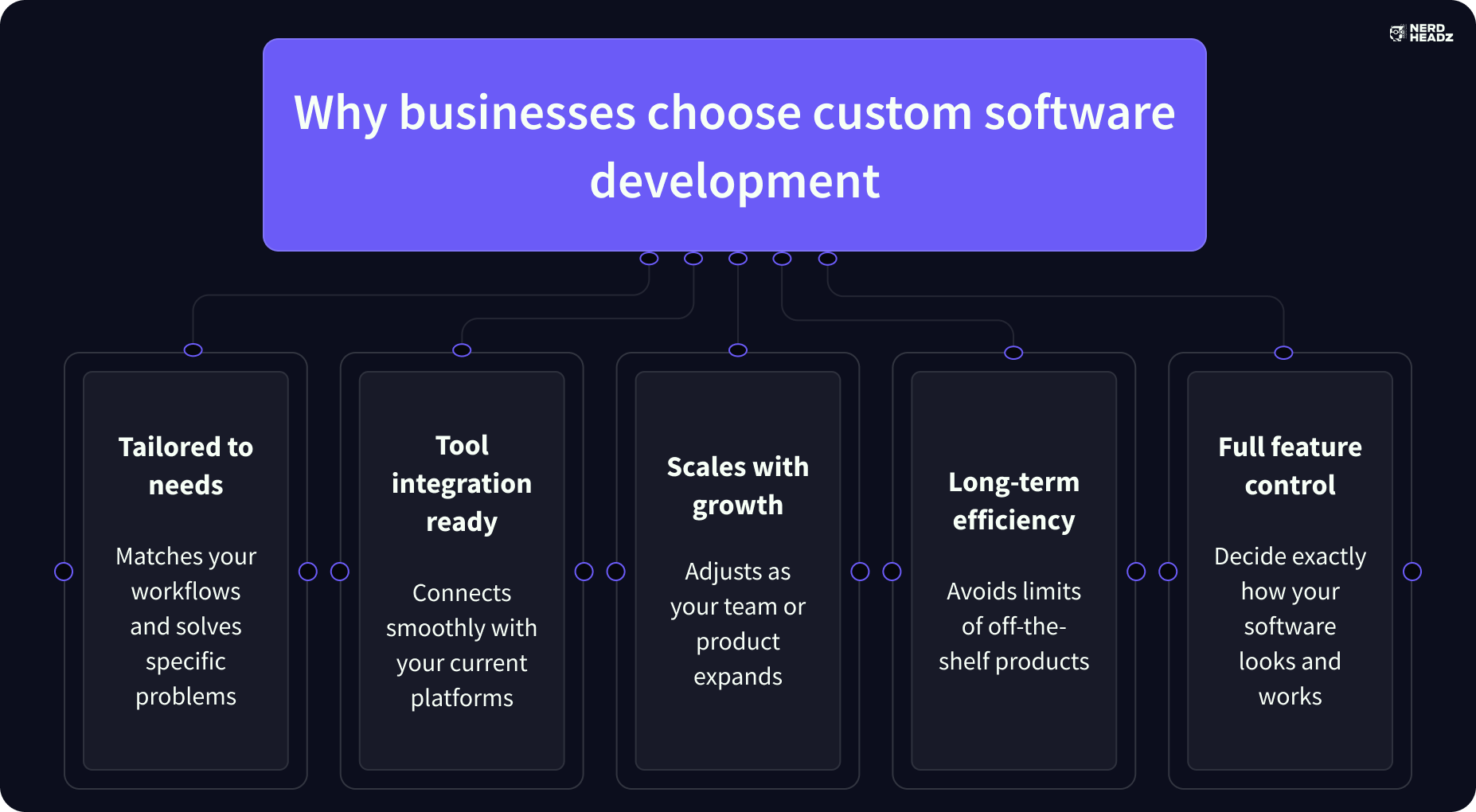
A full software development lifecycle (SDLC) typically guides the custom build from discovery and design to delivery and future updates.
Unlike off-the-shelf solutions, which offer generic features aimed at broad audiences, custom development gives businesses complete control over how the application looks, functions, and integrates with existing software or other systems.
Some key characteristics of customized software include:
- Personalization: Built around your business requirements, not predefined templates
- Flexibility: Evolves as your organization grows
- Integration: Connects cleanly with your current tools and platforms
When businesses invest in custom software, they create systems that support present demands and future goals without imposing unnecessary compromises.
How Does Custom Software Improve Business Performance?
The right custom software solution supports real business outcomes, not just technical upgrades. By aligning tools with actual business operations, companies remove friction, reduce overhead, and increase efficiency.
Instead of adapting workflows to match the limitations of off-the-shelf software, teams can work with a custom software development company to create features that simplify complex tasks, automate repetitive processes, and support decision-making.
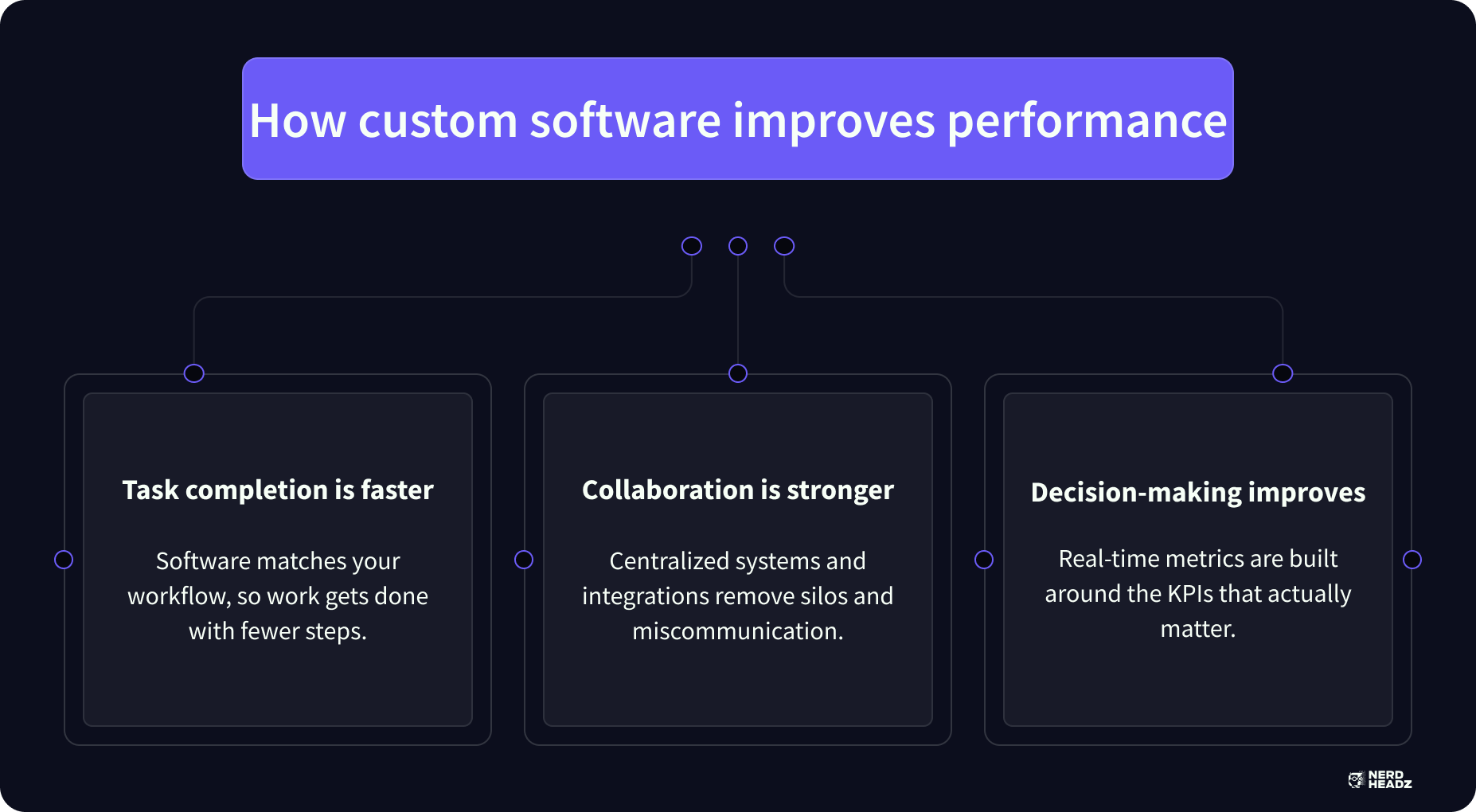
Performance improves in several key areas:
- Faster task completion due to intuitive interfaces and process alignment
- Stronger collaboration from integrated systems and centralized data
- Lower error rates with tools built around your exact workflow
Developing custom software also allows for performance tracking features tailored to your industry. Dashboards, alerts, and metrics can reflect the KPIs that actually matter to your team.
In short, custom software development doesn’t just provide features, it builds systems that support how you work, improving agility and driving better outcomes across the board.
Why Custom Software is Better Than Off-the-Shelf Software?
While off-the-shelf solutions may seem convenient at first, they often fall short when it comes to meeting specific business needs. They’re built to serve broad audiences, not the unique challenges your team faces daily.
Custom software, on the other hand, is built around how you operate. Every feature is shaped by your goals, workflows, and business processes, helping teams move faster and more confidently.
For teams weighing custom software vs. off-the-shelf, control and customization often make the difference long term.
Key advantages include:
- Full system integration with existing software and third-party tools
- Greater flexibility to modify features as priorities shift
- Ownership and control over updates, data, and functionality
With customized solutions, you eliminate unnecessary features, avoid license bloat, and reduce dependency on third-party vendors. And unlike off the shelf alternatives, there's no waiting for product updates or navigating limitations that don’t fit your workflow.
Working with a reliable custom software development company ensures your tools are designed to solve real problems, helping you stay productive and maintain a competitive edge.
Benefits of Custom Software Development
1- Flexibility & Scalability
One key advantage of custom software development is how easily it adapts. Businesses evolve, and software must evolve with them. Custom-built software gives you room to scale without switching systems or dealing with restrictions tied to off-the-shelf tools.
Unlike platforms that cap your growth or require costly upgrades, custom software can be expanded feature by feature.
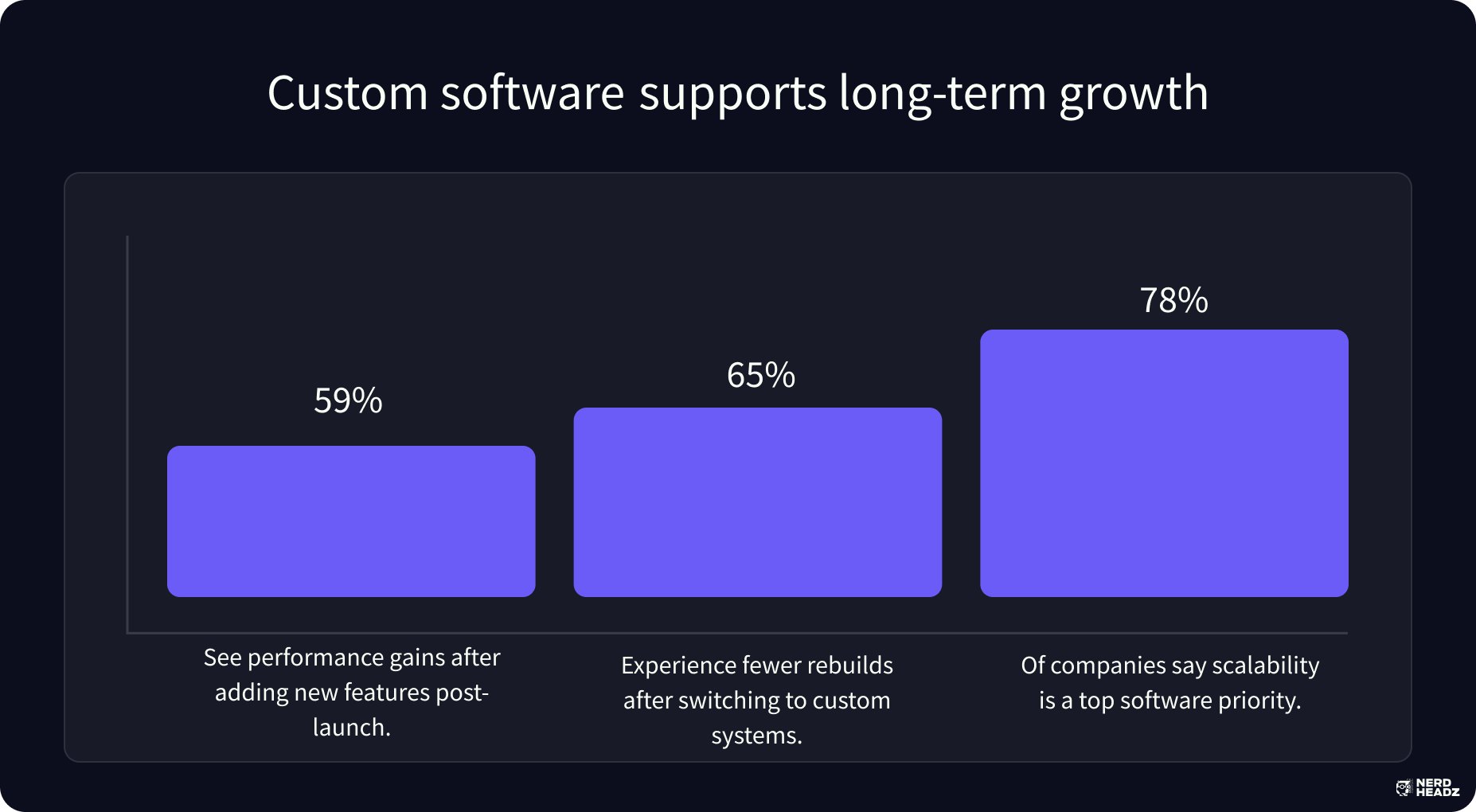
That means your teams keep working efficiently, even as demands increase or processes shift.
When developed correctly, these systems support:
- Feature updates that match your changing goals
- Seamless integration with other systems
- Performance under increasing load without rework
This adaptability leads to fewer interruptions and long-term savings. Instead of rebuilding your tech stack every few years, you improve what’s already working. That’s the kind of agility that generic shelf software can’t deliver.
Some companies even compare no code vs full code software development before deciding what structure supports their growth best.
Choosing custom solutions gives companies a flexible basis, built to scale confidently.
2- Personalization
Custom software stands out for one reason above all: it’s built around your exact needs.
Unlike off-the-shelf software, which delivers broad features for the average user, custom tailored solutions are designed to reflect how your team actually works.
This includes:
- Interfaces that match your workflows
- Integrations with your existing systems
- Functionality that supports your exact business requirements
By focusing on personalization, businesses reduce friction and increase productivity. Tools feel intuitive because they’re made for your processes, not adapted after the fact.
The ability to update as your needs grow is another major strength. This makes custom tools ideal for iterating on a minimum viable product (MVP) that grows with actual user needs.
With custom software development, you’re not locked into rigid structures, which is especially useful when planning how to build a marketplace with changing user roles and flows.. You can add features, remove unused ones, or pivot the tool entirely as goals change.
Working with a skilled development team ensures your software evolves with you, integrating with customized systems, supporting new teams, or responding to client demands.
Over time, this personalized fit becomes a clear competitive advantage. Some teams explore AI visual development for faster prototyping when they need early user validation before a full custom rollout.
3- Exclusive Ownership
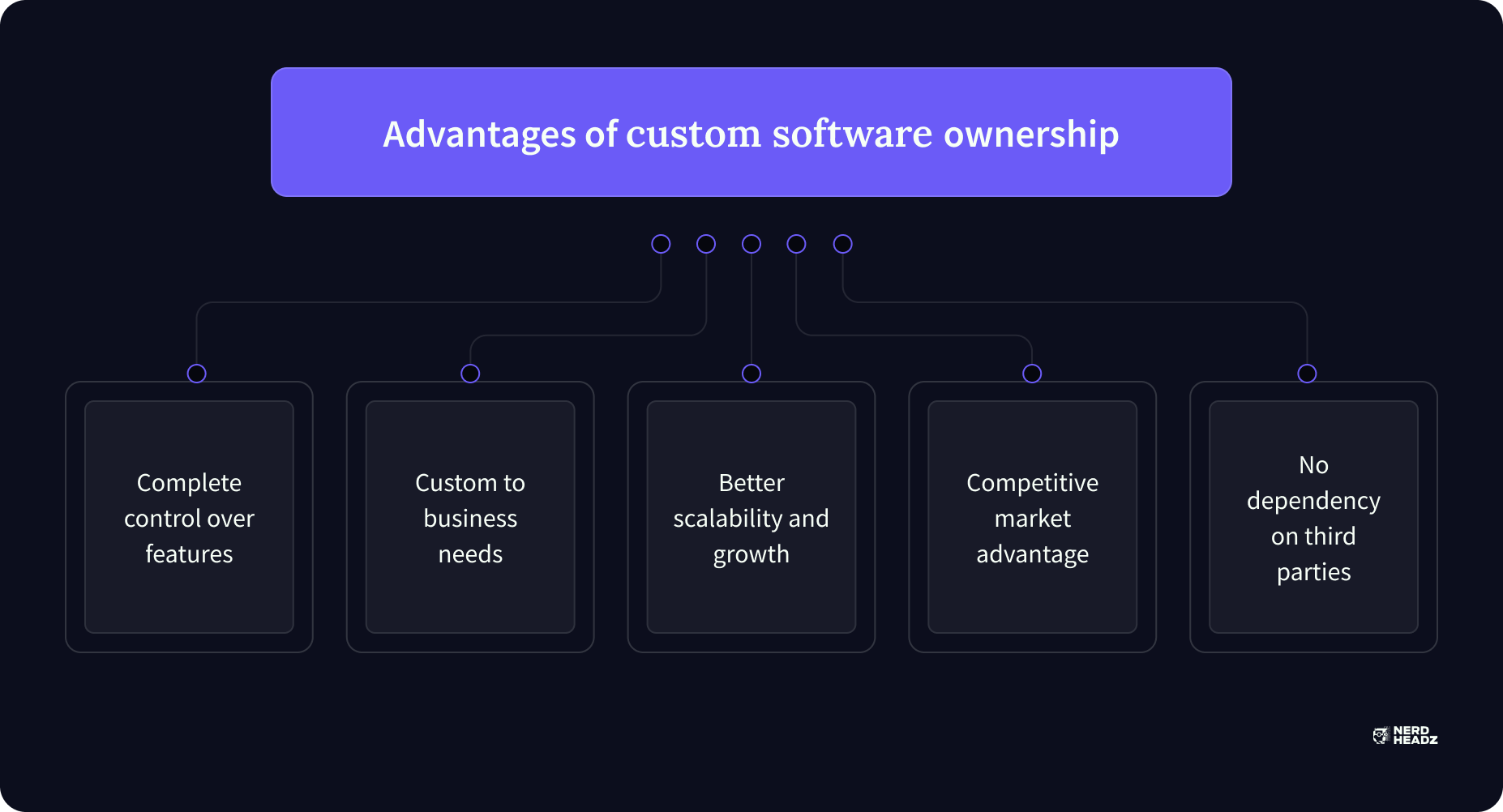
One of the most valuable custom software advantages is ownership. When you invest in a custom software solution, you gain full control, over features, data, and future development.
Unlike off-the-shelf platforms, where providers dictate the roadmap, updates, and access terms, custom-made software puts your team in charge. You can decide when to introduce changes, how the system behaves, and who has access.
Ownership also strengthens security. With customized software development, you decide where data lives and how it's protected, reducing reliance on third parties.
Your software also becomes an growing asset. Instead of reacting to vendor decisions, your business can iterate and improve based on its goals.
If you’re working with an experienced software development company, long-term value grows. The platform evolves with your team, not external updates or expired licenses.
For companies managing sensitive workflows, this level of control offers a true competitive edge.
4- Robust Security
Security concerns are a major reason many businesses explore custom software development. Instead of relying on widely available tools with known vulnerabilities, companies can define their own safeguards and protocols.
A tailored platform allows you to:
- Implement access controls that reflect your internal structure
- Encrypt data based on sensitivity and compliance needs
- Monitor user activity with systems that fit your workflows
Because your team oversees the architecture, updates and bug fixes happen on your terms, not a vendor’s timeline. This gives you agility when addressing potential threats.
Another benefit is reduced exposure. Generic applications are frequently targeted due to their widespread use, while custom made software, designed for a single organization, is far less predictable to attackers.
Organizations that manage sensitive data or operate in highly regulated spaces gain peace of mind from a solution that puts control back in their hands.
With guidance from a skilled software development company, your platform can incorporate defense mechanisms that grow stronger over time and adjust as risks develop. Some companies are now experimenting with retrieval augmented generation (RAG) to improve how internal data is accessed securely inside custom tools.
5- Return on Investment
Custom software isn’t just a technical decision, it’s a financial one. While upfront development may cost more than subscription-based tools, long-term results often make the case on their own.
Tailored systems help reduce waste by cutting features that don’t apply to your team. There’s no need to pay for broad packages packed with tools you’ll never use. Every element is designed to support how your business works.
That’s also why companies researching how to make a budget for software development often include total lifecycle savings when comparing options.
Efficiency improves across departments when automated tasks, systems communicate properly, and interfaces are built for real workflows. Time saved in these areas quickly turns into measurable value.
Maintenance is also easier to manage. Without dependence on outside vendors or third-party timelines, updates happen when needed, not when scheduled by someone else. That autonomy lowers recurring costs and avoids disruptions.
Over time, these advantages add up. You spend less fixing mismatches, reduce licensing overhead, and stay focused on what matters.
If AI is part of your roadmap, review these steps to integrate deep learning into SaaS business processes before locking in a custom build.
6- Cost-Effectiveness
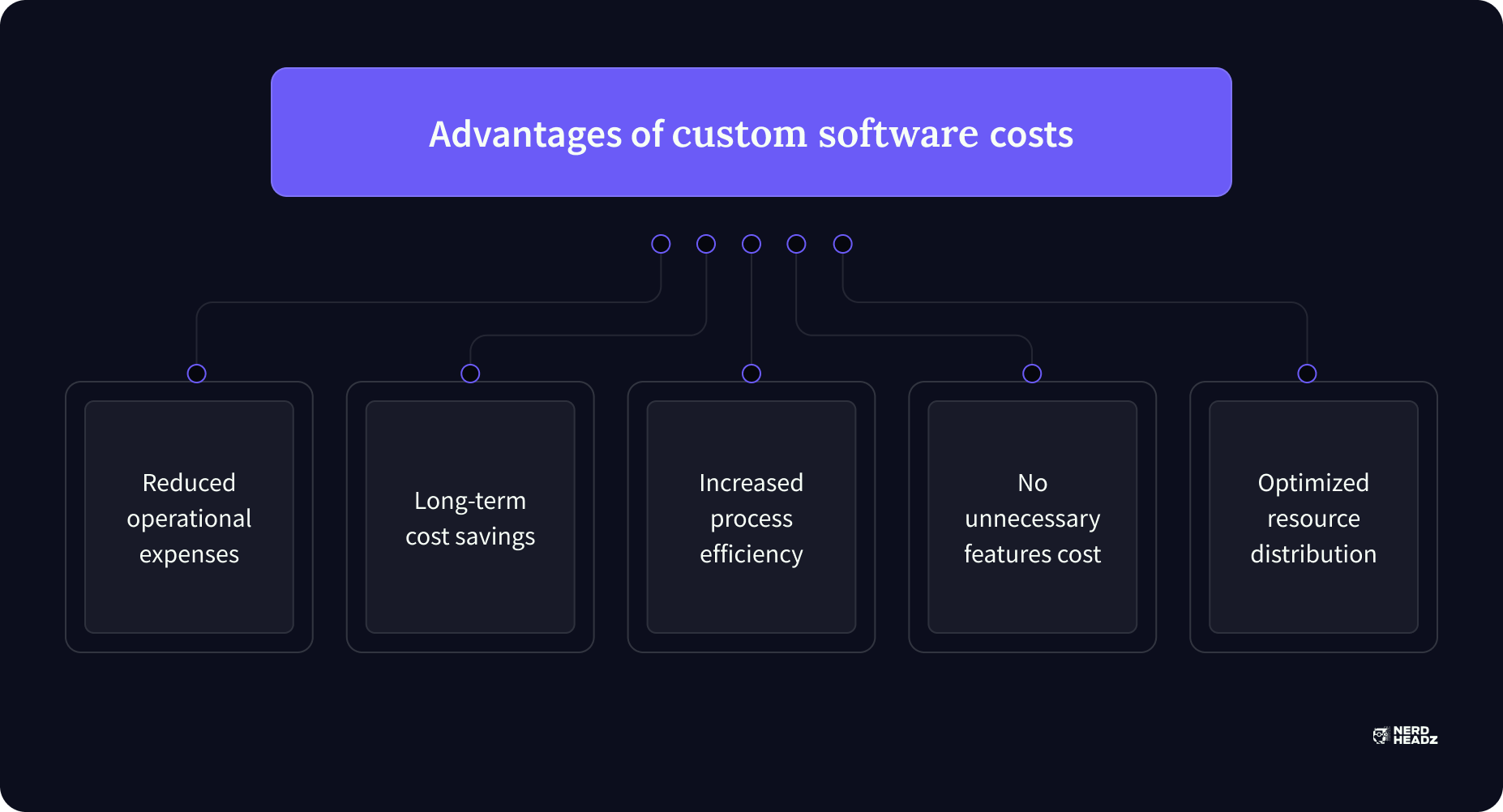
Custom software helps businesses manage budgets more effectively by eliminating unnecessary expenses built into generic platforms. Instead of paying for unused features or one-size-fits-all licensing, your team gets exactly what it needs, nothing more, nothing less.
One clear financial advantage is avoiding ongoing licensing fees. Most prebuilt tools require monthly or annual payments to access core functions.
With custom software, you invest once and retain full control over usage, upgrades, and expansion.
You also cut costs tied to inefficient workflows. Tailored applications reduce time spent switching between tools, fixing compatibility issues, or adapting internal processes to software limitations.
Because every feature serves a purpose, resources are allocated with intention. This leads to better planning, fewer delays, and more consistent output across teams.
Over time, businesses avoid replacement costs and expensive vendor add-ons. Instead, they continue working with a platform built to last and structured to support changing priorities, without paying for things they don’t need.
7- System Integration
Custom software connects with your existing systems in ways off-the-shelf tools often can’t.
Instead of reshaping your processes to match a fixed product, integration happens around how your teams already work.
A tailored platform supports:
- Real-time data sharing across tools
- Fewer silos between departments
- Centralized workflows that reduce manual input
Because the software is built with your structure in mind, it communicates directly with other systems, from CRMs to internal databases. This reduces the need for workarounds and helps teams stay focused.
Seamless integration also prevents data loss and improves accuracy. When information flows cleanly between platforms, users make better decisions and spend less time switching between apps.
Over time, integration improves collaboration and reduces delays.
Businesses can make updates without breaking links between tools or causing extra work for staff.
With the right software development team, you end up with a system that fits into your environment without disrupting it, and that's hard to find in generic products. This level of integration is particularly useful in enterprise app development, where internal systems need to work together at scale.
Are You Ready to Build Your Custom Software Solution?
Choosing to invest in custom software development starts with a clear understanding of what’s holding your current systems back.
Are manual tasks slowing things down? Is your team working around limitations instead of focusing on real priorities?
These are signs that your tools no longer match your business operations and that a custom software solution could offer a better fit.
Before moving forward, consider these important factors to weigh when choosing a custom software development partner to avoid long-term bottlenecks.
Unlike prebuilt platforms, personalized tools are designed to support your structure, not the other way around. That means faster workflows, improved accuracy, and fewer technical barriers across departments.
If you’ve been considering ways to improve efficiency, security, or user experience, now may be the right time to take the next step.
At NerdHeadz, our custom software development services are built for businesses that need tools tailored to real-world demands. We work closely with each client to map out goals, design with intent, and build platforms that support actual work, not assumptions.
Conclusion
Custom software development gives businesses the tools to solve problems that generic platforms can’t fix. Throughout this article, we’ve explored how tailored applications offer real advantages, from cleaner system integration to long-term budget control.
The benefits go beyond features.
When software is built around your actual business processes, teams move faster, systems communicate better, and fewer resources are wasted on unnecessary tools or workarounds.
Compared to off-the-shelf alternatives, customized solutions are designed to meet exact needs. That fit leads to better productivity, stronger data security, and tools that hold up as priorities shift.
For organizations looking to replace rigid systems with something purpose-built, this approach makes a difference where it counts, in daily work, in collaboration, and in results.
If you're ready to stop adapting your workflows to generic tools, NerdHeadz can help. Our software development company builds solutions with your structure, your goals, and your team in mind.
Contact us today to learn more!
NerdHeadz was recently recognized as a Clutch Global Web Development Leader, a reflection of our work with startups and growing businesses worldwide.
Frequently asked questions
What are the advantages of custom-written software?

Custom software development projects are tailored to meet specific needs, ensuring better functionality, scalability, and alignment with business processes. They offer more control and flexibility than standard solutions.
What is the difference between no code and custom code?

There are two ways to build software: no code, which uses pre-built tools for app creation and requires little or no programming skills, and custom code, where developers write unique software that offers greater flexibility and advanced customization.
What are the disadvantages of custom development?

Custom development can be more expensive and time-consuming compared to ready-made solutions. It also requires ongoing maintenance and support.
What is the difference between custom software and off-the-shelf software?

Custom software solutions are built specifically for a business, while off-the-shelf software is a ready-made solution for general use. Custom software is more personalized, but off-the-shelf is quicker and cheaper.

Luciani Woestemeier
Luciani Zorrilla is a content marketer with experience in sales development, outbound sales, SEO, design, email marketing, and UX. She stands out in driving sustainable growth for tech startups through impactful SEO strategies and leading results-oriented marketing teams.
Related Articles
Subscribe to our Newsletter
.webp)
.webp)
Are you ready to talk about your project?
Schedule a consultation with our team, and we’ll send a custom proposal.


Custom software development is a powerful way to create tools that match your exact goals. Instead of working around off-the-shelf constraints, businesses can invest in solutions built specifically to support how they operate and scale.
Many companies struggle with rigid systems that fail to adapt to shifting demands or complex workflows.
A tailored system addresses these limitations, offering tools that align with real business needs, not generic use cases.
From flexible design to direct integration capabilities with existing systems, custom software adapts to your processes, not the other way around. The result: fewer workarounds, better collaboration, and tools that evolve with you.
If you're exploring the advantages of custom software development, this guide will explain the real reasons businesses make the switch and what outcomes they can expect. This also applies to early-stage teams researching how to build a no-code SaaS and need flexibility without committing to full-stack hiring.
What is custom Software Development?
Custom software development is the process of designing applications that address specific goals, workflows, or challenges unique to a particular business.
Instead of purchasing off-the-shelf software, companies collaborate with a software development company or a dedicated team to create tools aligned with their operations, choosing between no code vs full code software development depending on project complexity and speed.
The main advantages of custom software come from how well it fits the organization's processes. Each feature is purpose-built, helping teams work more efficiently, improve service delivery, and remove bottlenecks.

A full software development lifecycle (SDLC) typically guides the custom build from discovery and design to delivery and future updates.
Unlike off-the-shelf solutions, which offer generic features aimed at broad audiences, custom development gives businesses complete control over how the application looks, functions, and integrates with existing software or other systems.
Some key characteristics of customized software include:
- Personalization: Built around your business requirements, not predefined templates
- Flexibility: Evolves as your organization grows
- Integration: Connects cleanly with your current tools and platforms
When businesses invest in custom software, they create systems that support present demands and future goals without imposing unnecessary compromises.
How Does Custom Software Improve Business Performance?
The right custom software solution supports real business outcomes, not just technical upgrades. By aligning tools with actual business operations, companies remove friction, reduce overhead, and increase efficiency.
Instead of adapting workflows to match the limitations of off-the-shelf software, teams can work with a custom software development company to create features that simplify complex tasks, automate repetitive processes, and support decision-making.

Performance improves in several key areas:
- Faster task completion due to intuitive interfaces and process alignment
- Stronger collaboration from integrated systems and centralized data
- Lower error rates with tools built around your exact workflow
Developing custom software also allows for performance tracking features tailored to your industry. Dashboards, alerts, and metrics can reflect the KPIs that actually matter to your team.
In short, custom software development doesn’t just provide features, it builds systems that support how you work, improving agility and driving better outcomes across the board.
Why Custom Software is Better Than Off-the-Shelf Software?
While off-the-shelf solutions may seem convenient at first, they often fall short when it comes to meeting specific business needs. They’re built to serve broad audiences, not the unique challenges your team faces daily.
Custom software, on the other hand, is built around how you operate. Every feature is shaped by your goals, workflows, and business processes, helping teams move faster and more confidently.
For teams weighing custom software vs. off-the-shelf, control and customization often make the difference long term.
Key advantages include:
- Full system integration with existing software and third-party tools
- Greater flexibility to modify features as priorities shift
- Ownership and control over updates, data, and functionality
With customized solutions, you eliminate unnecessary features, avoid license bloat, and reduce dependency on third-party vendors. And unlike off the shelf alternatives, there's no waiting for product updates or navigating limitations that don’t fit your workflow.
Working with a reliable custom software development company ensures your tools are designed to solve real problems, helping you stay productive and maintain a competitive edge.
Benefits of Custom Software Development
1- Flexibility & Scalability
One key advantage of custom software development is how easily it adapts. Businesses evolve, and software must evolve with them. Custom-built software gives you room to scale without switching systems or dealing with restrictions tied to off-the-shelf tools.
Unlike platforms that cap your growth or require costly upgrades, custom software can be expanded feature by feature.

That means your teams keep working efficiently, even as demands increase or processes shift.
When developed correctly, these systems support:
- Feature updates that match your changing goals
- Seamless integration with other systems
- Performance under increasing load without rework
This adaptability leads to fewer interruptions and long-term savings. Instead of rebuilding your tech stack every few years, you improve what’s already working. That’s the kind of agility that generic shelf software can’t deliver.
Some companies even compare no code vs full code software development before deciding what structure supports their growth best.
Choosing custom solutions gives companies a flexible basis, built to scale confidently.
2- Personalization
Custom software stands out for one reason above all: it’s built around your exact needs.
Unlike off-the-shelf software, which delivers broad features for the average user, custom tailored solutions are designed to reflect how your team actually works.
This includes:
- Interfaces that match your workflows
- Integrations with your existing systems
- Functionality that supports your exact business requirements
By focusing on personalization, businesses reduce friction and increase productivity. Tools feel intuitive because they’re made for your processes, not adapted after the fact.
The ability to update as your needs grow is another major strength. This makes custom tools ideal for iterating on a minimum viable product (MVP) that grows with actual user needs.
With custom software development, you’re not locked into rigid structures, which is especially useful when planning how to build a marketplace with changing user roles and flows.. You can add features, remove unused ones, or pivot the tool entirely as goals change.
Working with a skilled development team ensures your software evolves with you, integrating with customized systems, supporting new teams, or responding to client demands.
Over time, this personalized fit becomes a clear competitive advantage. Some teams explore AI visual development for faster prototyping when they need early user validation before a full custom rollout.
3- Exclusive Ownership

One of the most valuable custom software advantages is ownership. When you invest in a custom software solution, you gain full control, over features, data, and future development.
Unlike off-the-shelf platforms, where providers dictate the roadmap, updates, and access terms, custom-made software puts your team in charge. You can decide when to introduce changes, how the system behaves, and who has access.
Ownership also strengthens security. With customized software development, you decide where data lives and how it's protected, reducing reliance on third parties.
Your software also becomes an growing asset. Instead of reacting to vendor decisions, your business can iterate and improve based on its goals.
If you’re working with an experienced software development company, long-term value grows. The platform evolves with your team, not external updates or expired licenses.
For companies managing sensitive workflows, this level of control offers a true competitive edge.
4- Robust Security
Security concerns are a major reason many businesses explore custom software development. Instead of relying on widely available tools with known vulnerabilities, companies can define their own safeguards and protocols.
A tailored platform allows you to:
- Implement access controls that reflect your internal structure
- Encrypt data based on sensitivity and compliance needs
- Monitor user activity with systems that fit your workflows
Because your team oversees the architecture, updates and bug fixes happen on your terms, not a vendor’s timeline. This gives you agility when addressing potential threats.
Another benefit is reduced exposure. Generic applications are frequently targeted due to their widespread use, while custom made software, designed for a single organization, is far less predictable to attackers.
Organizations that manage sensitive data or operate in highly regulated spaces gain peace of mind from a solution that puts control back in their hands.
With guidance from a skilled software development company, your platform can incorporate defense mechanisms that grow stronger over time and adjust as risks develop. Some companies are now experimenting with retrieval augmented generation (RAG) to improve how internal data is accessed securely inside custom tools.
5- Return on Investment
Custom software isn’t just a technical decision, it’s a financial one. While upfront development may cost more than subscription-based tools, long-term results often make the case on their own.
Tailored systems help reduce waste by cutting features that don’t apply to your team. There’s no need to pay for broad packages packed with tools you’ll never use. Every element is designed to support how your business works.
That’s also why companies researching how to make a budget for software development often include total lifecycle savings when comparing options.
Efficiency improves across departments when automated tasks, systems communicate properly, and interfaces are built for real workflows. Time saved in these areas quickly turns into measurable value.
Maintenance is also easier to manage. Without dependence on outside vendors or third-party timelines, updates happen when needed, not when scheduled by someone else. That autonomy lowers recurring costs and avoids disruptions.
Over time, these advantages add up. You spend less fixing mismatches, reduce licensing overhead, and stay focused on what matters.
If AI is part of your roadmap, review these steps to integrate deep learning into SaaS business processes before locking in a custom build.
6- Cost-Effectiveness

Custom software helps businesses manage budgets more effectively by eliminating unnecessary expenses built into generic platforms. Instead of paying for unused features or one-size-fits-all licensing, your team gets exactly what it needs, nothing more, nothing less.
One clear financial advantage is avoiding ongoing licensing fees. Most prebuilt tools require monthly or annual payments to access core functions.
With custom software, you invest once and retain full control over usage, upgrades, and expansion.
You also cut costs tied to inefficient workflows. Tailored applications reduce time spent switching between tools, fixing compatibility issues, or adapting internal processes to software limitations.
Because every feature serves a purpose, resources are allocated with intention. This leads to better planning, fewer delays, and more consistent output across teams.
Over time, businesses avoid replacement costs and expensive vendor add-ons. Instead, they continue working with a platform built to last and structured to support changing priorities, without paying for things they don’t need.
7- System Integration
Custom software connects with your existing systems in ways off-the-shelf tools often can’t.
Instead of reshaping your processes to match a fixed product, integration happens around how your teams already work.
A tailored platform supports:
- Real-time data sharing across tools
- Fewer silos between departments
- Centralized workflows that reduce manual input
Because the software is built with your structure in mind, it communicates directly with other systems, from CRMs to internal databases. This reduces the need for workarounds and helps teams stay focused.
Seamless integration also prevents data loss and improves accuracy. When information flows cleanly between platforms, users make better decisions and spend less time switching between apps.
Over time, integration improves collaboration and reduces delays.
Businesses can make updates without breaking links between tools or causing extra work for staff.
With the right software development team, you end up with a system that fits into your environment without disrupting it, and that's hard to find in generic products. This level of integration is particularly useful in enterprise app development, where internal systems need to work together at scale.
Are You Ready to Build Your Custom Software Solution?
Choosing to invest in custom software development starts with a clear understanding of what’s holding your current systems back.
Are manual tasks slowing things down? Is your team working around limitations instead of focusing on real priorities?
These are signs that your tools no longer match your business operations and that a custom software solution could offer a better fit.
Before moving forward, consider these important factors to weigh when choosing a custom software development partner to avoid long-term bottlenecks.
Unlike prebuilt platforms, personalized tools are designed to support your structure, not the other way around. That means faster workflows, improved accuracy, and fewer technical barriers across departments.
If you’ve been considering ways to improve efficiency, security, or user experience, now may be the right time to take the next step.
At NerdHeadz, our custom software development services are built for businesses that need tools tailored to real-world demands. We work closely with each client to map out goals, design with intent, and build platforms that support actual work, not assumptions.
Conclusion
Custom software development gives businesses the tools to solve problems that generic platforms can’t fix. Throughout this article, we’ve explored how tailored applications offer real advantages, from cleaner system integration to long-term budget control.
The benefits go beyond features.
When software is built around your actual business processes, teams move faster, systems communicate better, and fewer resources are wasted on unnecessary tools or workarounds.
Compared to off-the-shelf alternatives, customized solutions are designed to meet exact needs. That fit leads to better productivity, stronger data security, and tools that hold up as priorities shift.
For organizations looking to replace rigid systems with something purpose-built, this approach makes a difference where it counts, in daily work, in collaboration, and in results.
If you're ready to stop adapting your workflows to generic tools, NerdHeadz can help. Our software development company builds solutions with your structure, your goals, and your team in mind.
Contact us today to learn more!
NerdHeadz was recently recognized as a Clutch Global Web Development Leader, a reflection of our work with startups and growing businesses worldwide.

Luciani Zorrilla is a content marketer with experience in sales development, outbound sales, SEO, design, email marketing, and UX. She stands out in driving sustainable growth for tech startups through impactful SEO strategies and leading results-oriented marketing teams.

%201.svg)

%201.svg)
%201.webp)

%201.webp)








